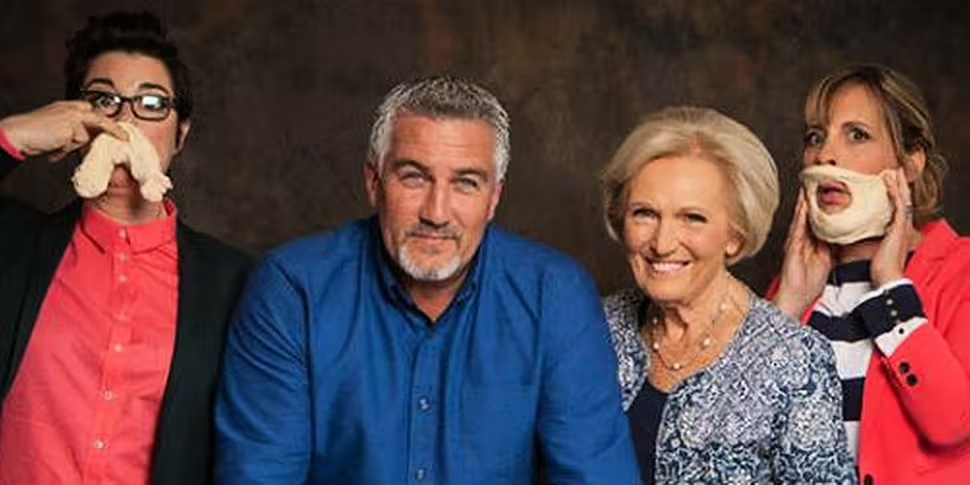For the last month and a half, Wednesday evenings have been whipped up into a frenzy by whisks, measuring scales, and cake stands. Between knowing wordplay, booze-soaked cakes, structurally-unsound patisserie, and a variety of facial expressions so diverse and extreme that the show should really be used as a guide for people on the spectrum, the world’s nicest reality TV show raises the stakes on kitchen-sink drama. Just how did the Great British Bake Off become a cultural phenomenon?
Presenting us with a vision of Britain so charming and nice – a pastel-coloured Enid-Blyton Blighty of multicultural, non-denominational church fêtes attended by an intersex Women’s Institute – the BBC show showcases an incredibly palatable slice of UK nationalism. All that’s missing from the set, really, is a Keep Calm and Carry On poster for Mel and Sue to point to whenever the ‘Technical Bake’ collapses upon plating.
What shows no sign of collapsing is the number of people tuning in to watch the final. Having started out on BBC Two in the late summer of 2010, by the end of the series’ six-episode run, 2.75m viewers tuned into the final to see Edd named the ultimate ‘Star Baker’. Last year, having graduated to BBC One, at its peak, 12.3m people watched Nancy’s Moulin-Rouge ruff-puff masterpiece secure her victory. A stiff peak, when you consider that only 12.1m had watched in to the World Cup final on the channel in July.
And be it in cups or grams, the world has taken measure of the show and taken it to heart, while the British national broadcaster has been taking it to the bank. Like Top Gear or Strictly Come Dancing before it, GBBO has been, contrary to its traditionally hand-made philosophy, shipped out in ready-to-assemble packages to 196 territories worldwide – including TV3’s Irish version, The Great Irish Bake Off, complete with its very own wise-cracking lesbian presenter and a judge named Paul. The show's Máire Berry, Biddy White Lennon, is to be replaced by Lilly Higgins when GIBO returns to the TV3 schedule later this year.
A madness to the method
The format has worked a mould – and become a hit – all over the world; in English-speaking territories, it’s a mixture of greatness, Great Irish, Great Australian, Great South African. In Nordic nations, things are a dollop more inclusive, where All of Sweden and All of Norway Bake, while The Whole of Finland takes its turn at licking the spoon and washing up afterwards. Only Denmark eschews the hundred-and-thousands colour scheme of pastel pinks and blues, opting instead, in true Scandi-noir style, for a minimalist set of black and pine, with the contestants battling it out to win Den Store Bagedyst, the ‘Great Bake Fight’.
Although the fact that Turkey's Ver Fırına makes the contestants do a little dance while the opening credits play out does set it apart from the rest of the crowd, and give international audiences a clear indication of who we want to win:
And all this in a show where the most stressful thing that happens is when a mousse fails to set. How has it conquered the world?
It's a bit of television alchemy, a jovial mix of tension, ribald puns, and charming contestants is a massive hit around the world, all the more surprising when you consider just how nice it all is. Nobody stabs anybody in the back in the Bake-Off tent, a mainstay and plot device in nearly every other competitive reality show. Admittedly, pulling a Brutus is all the harder to do when the nearest shank to hand is an offset palette knife. But while it’s clear that every baker in the final rounds does want to win, they want to win by being the best baker, not by beating the other ones. They offer each other help lifting things in and out, on and off of ovens, hobs, or plates, the clap and celebrate each others' successes, and do everything they seemingly can to prevent each others' failures.

The three contestants in tonight's final, Ian, Nadiya, and Tamal [Facebook]
And nobody competing is using the most popular show on BBC One as a launchpad for further fame down the line. The prize is in the glory – the actual prize is an engraved cake stand. While previous winners and runners-up might secure a publishing deal for their recipes or a food column with a newspaper, none of them has signed on to appear on Celebrity Big Brother or to take a bite out of a 'Bush Tucker Trial' on ITV.
Arguably the biggest star on the show is Mary Berry, an 80-year-old woman who has become one of the most influential style icons in Britain today. The clothes in her outfits, neon florals and age-redefining jackets, considerably more fashion-forward and styled since the show's first run, routinely sell out in online stores in the days after each episode, while FHM, the quintessential lads' mag, this year named her the 73rd sexiest woman in the world, just behind Angelina Jolie.
The Great British Bake Off works, raising the game as the ultimate comfort food. And in the universal language of desserts, it's clear that viewers all over the globe are looking to gobble up another slice. Now if Nadiya, Tamal or Ian could just do some Turkish twerking as they make their way into the tent, well... in the words of Mary, that would be...









